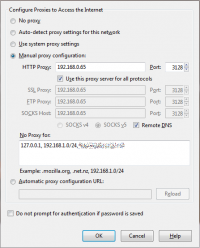software:linux:squid
Table of Contents
Routing DNS Through Squid
/etc/squid3/squid.conf # # DNS OPTIONS # ========== # dns_timeout 10 seconds dns_nameservers 192.168.1.1 8.8.8.8 8.8.4.4 # DNS Server #
From:
grep -v "^#" /etc/squid/squid.conf | sed -e '/^$/d'
Firefox Proxy settings
Squid Package Tuning
From: https://forum.pfsense.org/index.php?topic=57230.0
So that would be my suggestion:
Hard disk cache size 15GB
Hard disk cache system aufs or ufs (increase vfs.read like you did already) Test which
performs better
Memory cache size 32MB
Minimum object size 16KB (I set it to 64 KB because I do not want that so many small
files will be cached. This increases HDD read/write and my WAN bandwidth allows that
to download such small files directly from the web and not from squid)
Maximum object size 1GB ( ServicePacks do have sizeses until 1GB. If you do not want
to cache all kind of service packs than probably a size of 256MB will be enough to get
most of the available updates in cache)
Maximum object size in RAM 2MB (In RAM I would like to have only small files which could
be served very fast. I do not want to have a 100MB file in RAM which wastes much space
and could be served fast enough even from HDD)
Memory replacement policy LRU (RAM should cache actual objects)
Cache replacement policy Heap LFUDA (what to cache servicepacks and big files on HDD)
How much memory do I need in my Squid server?
From: http://wiki.squid-cache.org/SquidFaq/SquidMemory#How_much_memory_do_I_need_in_my_Squid_server.3F
As a rule of thumb on Squid uses approximately 10 MB of RAM per GB of the total of all cache_dirs (more on 64 bit servers such as Alpha), plus your cache_mem setting and about an additional 10-20MB. It is recommended to have at least twice this amount of physical RAM available on your Squid server.
curl-loader
From: http://curl-loader.sourceforge.net/
curl-loader (also known as "omes-nik" and "davilka") is an open-source tool written in C-language, simulating application load and application behavior of thousands and tens of thousand HTTP/HTTPS and FTP/FTPS clients, each with its own source IP-address. In contrast to other tools curl-loader is using real C-written client protocol stacks, namely, HTTP and FTP stacks of libcurl and TLS/SSL of openssl, and simulates user behavior with support for login and authentication flavors. The goal of the project is to deliver a powerful and flexible open-source testing solution as a real alternative to Spirent Avalanche and IXIA IxLoad.
HTTP status codes
From: http://www.comfsm.fm/computing/squid/FAQ-6.html
These are taken from RFC 2616 and verified for Squid. Squid-2 uses almost all codes except 307 (Temporary Redirect), 416 (Request Range Not Satisfiable), and 417 (Expectation Failed).
Squid Log Files
From: http://wiki.squid-cache.org/SquidFaq/SquidLogs
The Squid result code is composed of several tags (separated by underscore characters) which describe the response sent to the client.
software/linux/squid.txt · Last modified: 2016/11/13 19:11 by superwizard

